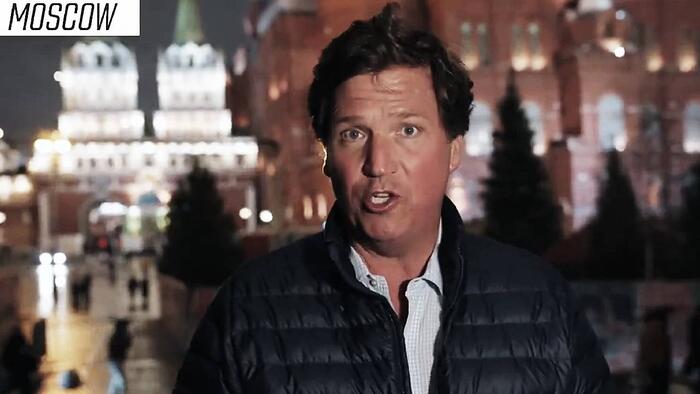In a recent discussion authored by Steve Watson for Modernity.news, Tucker Carlson has returned to Moscow to interview Russian Foreign Minister Sergey Lavrov, as tensions between the U.S. and Russia escalate under the Biden administration. Carlson frames the current situation as one where the U.S. is inching closer to a hot war with Russia, emphasizing that the conflict is largely unacknowledged by the American public. He references his previous interview with Vladimir Putin and highlights alarming developments in U.S.-Russia relations, stating that military actions have taken place leading to Russian casualties. Carlson characterizes this as an undeclared war that the American people did not consent to, warning that the conflict is leading the world toward a potential nuclear confrontation.
Carlson expresses deep concern about the increasing hostility between the two nations, underscoring that the U.S. is presently in a particularly precarious situation—much more precarious than during historical flashpoints such as the Cuban Missile Crisis. According to Carlson, American military actions against Russian forces in Russia have drastically shifted the landscape of international relations. This raises existential questions about the future of both nations and the broader implications for global stability if the crisis escalates uncontrollably. Carlson argues that the current administration’s actions are pushing the global community toward an unprecedented and potentially devastating outcome.
Moreover, Carlson touches upon the lack of diplomatic efforts from the Biden administration in addressing the escalating conflict, implying that a complete withdrawal from communication with Russia could be seen as reckless. He suggests that there is a vacuum of leadership in diplomatic conversations, which is exacerbating tensions and leaving the door open for catastrophic outcomes. Although he attempts to reach out to Ukrainian President Zelenskyy for a dialogue, he claims that U.S. government intervention has hindered his efforts, showcasing a troubling trend of restricting open discourse on one of the most pressing issues of our time.
Interestingly, Carlson highlights the irony of being in a state of war with Russia while the American populace remains largely unaware. This disconnect raises questions about the effectiveness of media communication and the responsibility of leaders to keep the public informed about the realities of geopolitical conflicts. Carlson’s urgent tone suggests that the American public must become more engaged with the situation in order to prevent further escalation and promote a more peaceful resolution.
The discussion takes an interesting turn when Democratic strategist James Carville offers praise for Carlson’s influence in shaping narratives within the Biden administration. Carville asserts that Carlson has unparalleled sway over Trump’s cabinet choices, framing him as a powerful figure in contemporary politics. This portrayal of Carlson as a significant influencer implies that his narratives and views on Russia have garnered significant weight in political discussions, influencing key players and potentially steering U.S. policy in ways that align with his perspective on the necessity of diplomatic engagement.
Overall, the content brings into focus the critical junction at which U.S.-Russia relations currently stand, emphasizing the alarming potential for conflict escalation. Carlson’s return to Moscow and his advocacy for dialogue amidst increasing military actions underline the urgent need for American leadership to be more transparent and involved in diplomatic engagements. As tensions continue to rise, the stakes of international relations have never been higher, necessitating informed participation from the American public and responsible governance to mitigate the risks of a catastrophic confrontation.

